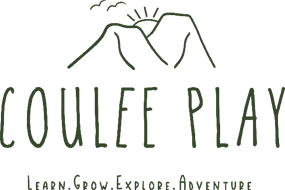Children need time to explore, learn, and create in an outdoor setting – a need which has only increased due to the recent and ongoing COVID-19 pandemic. Led by concerns around children’s mental and physical health and backed by extensive research, Coulee Play is a Lethbridge based program for children of all ages which fosters toy-free, imaginative play and investigation of the natural environment we share.
Coulee Play is first and foremost outdoor (rain or shine!) child-led play. This means that with supervision, the children are free to play as they wish including engaging in “risky” play such as tree climbing, “stick-sword” fighting, racing, and more. This much needed program allows children to get the outdoor playtime they need in order to effectively meet their social emotional needs while, at the same time, offering parents an opportunity for a well-deserved break with quality childcare.
Coulee Play is also a great opportunity for you to connect with other parents while your children connect with new friends. During one session of our programming, parents will be invited to participate in order to observe the magic that occurs in child-led play. Though this is not mandatory this opportunity can be beneficial to your health as well! Local studies have shown that both parents and children have increased feelings of loneliness and isolation as a result of the COVID-19 pandemic. Our overall sense of community has been severely impacted and Coulee Play is a great way for both children and parents to make connections and build relationships.

Please visit our Registration Page for current program availability.
For inquiries about Coulee Play, please contact [email protected] or call 403-360-6770.
FAQ and Further Resources

What are the benefits of outdoor play?
Countless studies show outdoor play improves/increases:
- Mental and emotional health – lowers cortisol, regulates emotions, promotes calmness, increases resiliency
- Physical health (cardiovascular, respiratory, weight) and reduce the risk of chronic health diseases
- Gross Motor Skills – balance, jumping, climbing, etc.
- Fine Motor Skills – knot tying, shovel use, pencil coordination, etc.
- Concentration, and sustained ability to pay attention, focus
- Social skills/conflict resolution skills – skills to work with others, deal with disagreements, etc.
- Creativity – create games, imaginary play, fantasy, etc.
- Circadian rhythms (our bodies internal clock that tells us when to wake/sleep) and therefore causes better sleep schedules
- Grow up as responsible environmental stewards
What is Child-led play and why is it beneficial?
Unstructured or Child-led/ Child-managed play happens when children are allowed to follow their own ideas without a defined purpose or outcome. They decide their own rules, invent their own games, manage their own conflicts, and set their own boundaries. This style of open-ended play is integral to healthy development and promotes imagination, creativity, social skills, and conflict resolution skills among other things.
What is “risky”play and why is it beneficial?
Risky play is any play that includes “risky” behaviours or elements such as heights, speed, play fighting, or “dangerous” items such as sticks, rocks, fire, water, and more. Studies show that children who engage in “risky” play were found to be more active, more socially and psychologically healthy, and had no higher rate of injury than other children.
See “Roughhousing and Climbing Trees: Some Risks May Be Good for Kids” below in our Further Resources section for more information.


Further Resources
Building Brains Together, COVID-19 Parent Surveys, Research Articles and Publications
https://www.buildingbrains.ca/research
Canadian Public Health Association,
About Unstructured Play
https://www.cpha.ca/unstructured-play
Live Science, Roughhousing and Climbing Trees:
Some Risks May Be Good for Kids
https://www.livescience.com/51259-risky-play-good-for-kids.html
“When children play the way they want outdoors they move more, sit less and play longer. They get their hands dirty and are exposed to microbes that help them build immunity. They make their own goals and figure out the steps to attain those goals. They learn, build resilience, develop social skills, and learn how to manage risks and keep safe.”
– JOEL BARNES,
Outdoor Play Canada
“Active free play outdoors is becoming rare, a thing of the past. Yet is is more important than ever that we stop overscheduling our children and start to reintroduce more opportunities for play and movement. Children’s minds and bodies depend and thrive on active free play.”
– ANGELA HANSCOM,
Pediatric Occupational Therapist
